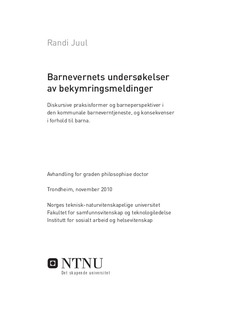| dc.description.abstract | When the municipal child welfare services in Norway receive notifications of concern regarding a child they are responsible for reviewing the general situation and assistance requirements of the relevant child and determining whether the case should be dismissed or not. In this dissertation we will consider a study carried out by three municipal child welfare institutions on notifications of concern and requests for assistance that involve nine families with altogether 19 children aged between 2 and 12. I will focus on discursive forms of practice and perspectives of children that relate to the studies carried out by the child welfare authorities and also have a closer look at the consequences these may have for the relevant children.
I have collected data on the notifications of concern and requests for assistance which formed the basis of the study of 9 cases by the child welfare authorities, including the child welfare workers’ analytical procedures, the questions and thematic focus of the study, who had been invited to contribute information, their narratives of the child’s situation and assistance requirements and the child welfare workers’ own conclusions and decisions in these cases. I have also carried out interviews with child welfare workers, parents and children who have been involved in the above mentioned inquiry. The analysis of the empirical material has been inspired by Michel Foucault and Norman Fairclough. They are both concerned with the role of language and discourse in the development of practises. With the help of a micro-analytical focus I have attempted to make some interpretations with regard to the tendencies and practises I have discussed in the analysis.
The notifications of concern, on which the study of the child welfare authorities were based, centred on children’s behaviour/manners, delays in children’s evolution, violence between parents in the presence of children, the mental health of parents, suspicions of sexual abuse and allegations about gross neglect. Parents who themselves have been in touch with the child welfare authorities and requested assistance emphasized the challenges of their daily workload and asked for relief. The three municipal child welfare institutions in part relied on different approaches (different research models and research categories) in order to examine the children’s situation and requirements, regardless of the uniqueness of each case. Most of the informants used by the child welfare authorities were adult persons (parents and various representatives from the professions). In two out of nine cases, children got the opportunity to provide the premises for the decisions reached in the cases. The attitude of the child welfare workers and their inclination to involve children in the research process differed from study to study. However, there was a general tendency to exclude the perspectives and narratives of the children, who were not treated as meaningful subjects in the process of inquiry. There was hardly any emphasis on their rights (the right to information and the right to express opinions). Other discourses were given priority over the discourse of rights.
In the process of inquiry, the child welfare workers primarily sought to obtain individual descriptions of children and parents, narratives about the childhood of parents and accounts of interplay within the family. This indicates that child welfare workers rely on psychological knowledge. They also tended to study family networks and to some extent searched for information regarding the everyday life and its structure within the families. There was little focus on living conditions or how the family members handled various challenges in their daily lives. For the most part, deviant children (the children were described in terms of delayed development, lack of social skills, lack of empathy, ADHD, and similar things) and parents who failed in their parenting duties or parents who had requested assistance were highlighted in the narratives by the various professionals and in the conclusions drawn by the child welfare authorities. The conclusions made by child welfare authorities were marked by a lack of specific and contextual information. In eight of the cases it was decided to offer the parents advice and guidance, whereas relief measures were recommended in two of the cases. One of the cases was dismissed. A decision to offer concrete assistance to the children was not reached in any of the cases, in spite of specific measures to assist the children having been mentioned in a number of the cases.
The children are constituted as something different than the adults. This difference is not only linguistically generated through the way we talk about them, but also through the fact that child welfare workers largely ignore them in the process of inquiry. This reflects the hegemony of knowledge that prevails within the current child welfare services, how knowledge becomes productive with regard to the positioning of children and parents. Both the notifications of concern and the studies of the child welfare authorities demonstrate that the language we use is not neutral. The use of language (academic terms) and the thematic focus evident in the notifications of concern and studies were closely related to the specific task and institutional connections of the various participants. In relation to the inquiries and decisions carried out by the child welfare authorities, several discourses together form a certain order of discourse. I have attempted to show that the research practise of the child welfare authorities is not only marked by legal and economic power structures, but also that the power of knowledge strongly affects how the child welfare services are run | nb_NO |
